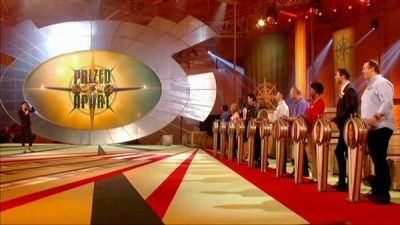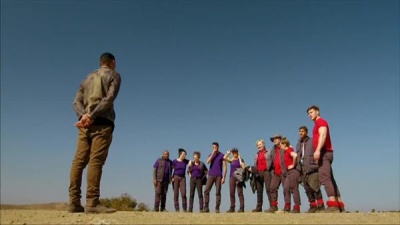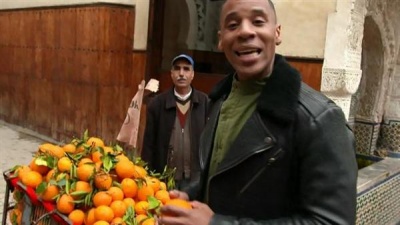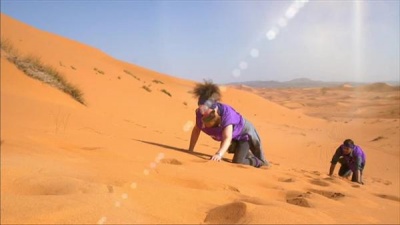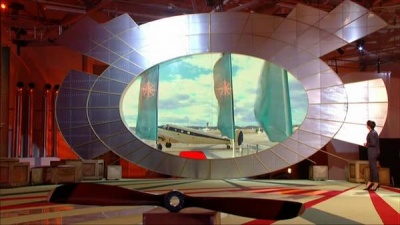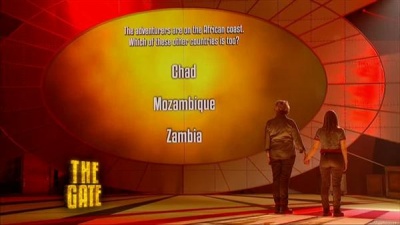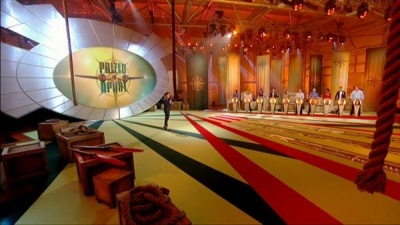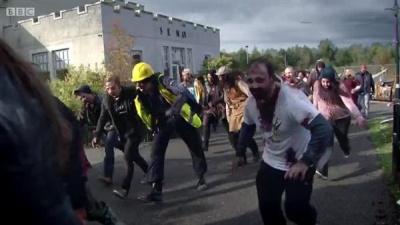Weaver's Week 2015-07-05
Last week | Weaver's Week Index | Next week
"Can we just call this the worst show of the year and be done with it?", asked one commentator recently. No. The Week, like the Raven's Eye, will not attempt to foretell the future. We do not yet know if someone will come up with a format completely broken, utterly irredeemable, and duller than The Parliament Channel. Also, Prized Apart isn't the worst primetime show on a major channel we've seen this year.
That said, Prized Apart isn't the best show we've seen all year.
Prized Apart
Electric Ray for BBC1, from 13 June
The basic plot is this. Players apply as couples, one adventurer and one studio player. The winning couple will win a "life-changing" prize. The studio player reports each week to an aircraft hangar near Farnborough, where Emma Willis is also camping out.
The adventurer goes to a slightly more exotic location. But where could be more exotic than an aircraft hangar near Farnborough? We can think of a few places. South Mimms service station. A small lake in the woods near Lille. The station buffet at Brussel-Zuid. In fact, it's difficult to think of many places less exotic than an aircraft hangar near Farnborough.
For this series, the producers have chosen to go to Morocco. The adventurous ten are joined by host, tormentor, and genial guide Reggie Yates. He has some challenges for the adventurers. The best performers will be safe; those remaining may be eliminated from the contest.
We first met the contenders while they were flying in a helicopter, preparing to jump out into a big lake. The jump from a great height is a common way to introduce players, we saw it on The Mole, we see it on every series of I'm a Celebrity, we saw it on Splash!. The adventurers on Prized Apart are going without a parachute, so they're not going to drop from a great height. The effect is more Treasure Hunt, with the skyrunner being handed a lifejacket again.
But we're not going to get a straightforward view of the players leaping from a height of about ten feet. No, the flow will be interrupted by filmed pieces about the players, and chats from Emma Willis in the aircraft hangar near Farnborough. Her guests, the studio partners, have shown their own level of daring. They've navigated the fearsome M25, they've passed through the many circles of hell at Waterloo station, and they're in a studio where ropes are just left hanging around.
Emma is a great interviewer, but here she's stuck asking banal questions. "Kevin, you know how Brittney has a fear of heights? How do you think she'll get on, jumping out of a chopper at almost ten feet up?" We're already distracted, trying to work out just how high ten foot is.
Later episodes replaced this oh-so-daring stunt with a reward challenge, something done by the players who continue in the contest because they escaped elimination. Soon enough, it's to the Team Task, a task undertaken by teams. According to the press release, this is an "adrenaline-fuelled, high-octane" challenge.
The first challenge was to build a raft. This isn't adrenaline-fuelled, this isn't high-octane. It's the sort of unimaginative thing we'd expect on a corporate away-day. Was there a mix-up in the booking? Somewhere in a slightly muddy field near Nantwich, was a group of middle managers confused when they were asked to trek five miles on some camels? If this is meant to be exciting, it was directed in the flattest, most anodyne manner possible. Here is a boat. Here is another boat. Here are some people paddling. Here is someone swimming and pushing the boat. Here are the backs of our eyelids.
Things got worse later in the series. Last week's task had teams moving through the market in Fez, tracking down various items on a shopping list, while lugging a cart containing many oranges. They could have done split-screen shots, building a narrative that the teams are close together (or far apart). They could have had a miniature camera trained on the one carpet in the whole shop that the teams looked for. They could have had a countdown clock, not just have Reggie say a couple of times how "the teams are up against a deadline".
With both teams arriving under time, and both bringing the complete list with them, the contest was decided by oranges they'd brought with them. Counting citrus fruit has never been so compelling!
Just when we're getting into the swing of things, just when the Morocco crew is beginning to establish a coherent story, they're stopped in their tracks. Emma drags us back to the aircraft hangar near Farnborough, where ten people are watching on. She asks leading questions, "Joey, your husband Jeffy is being bossed around by a woman. Is this usual?" It may be, it may not be, but it's consistent with the edit they've made.
Eventually, a winning team emerges. They're safe, and after a few quick messages home, will leave the show until next week's reward sequence. Their studio players are no longer required, and can return to their friends and family.
For the losing team, an actual Elimination Challenge. Leap out over a waterfall, grab a trapeze, and hold on for as long as you can. Or head out into the middle of a ravine, clip yourself onto a bungee rope, and dive. These are properly thrilling, something they don't get to do on a middle-management away-day. Even so, the huge challenges are shot in a pedestrian way, concealing their thrill behind a mundane patina.
The three worst contestants have been flown back to Farnborough Airport, and enter through the middle of the video wall. For a moment, the dry ice coming through the crack in the video wall reminds us of the Smokey Doors from Stars in Their Eyes. This is all done with the maximum of fuss.
Of the three to have come back to Blighty, the best performer in the Elimination Challenge is given a two-step head start in the quiz round, and first choice of the four available subjects. The second-best performer has a one-step head start, and picks from three subjects. The worst player has no head start, and a this-or-that choice.
The quiz questions are asked of the studio players, the ones who have been watching on as their friends and/or lovers go through their paces in Morocco. All the questions are multiple choice, with three possible answers. One space for a right answer, but a space is conceded to all the other players when the answer is wrong.
After an adventurer has scored five spaces (through their own work in Morocco, their partner's good work, and failures from other players), they approach The Gate, a space at the end of this playing area. There, Emma will ask a question that has some relevance to Morocco, or the week's team task, or the elimination challenge.
Success allows the adventurer to leave the studio. They exchange a brief hug with their playing partner, then leave through the video wall to board a small plane. Whoever's left when both seats on the plane are filled is out of the game, and cannot win the £100,000 top prize.
This final segment is tense, but it's a very artificial tension. Indeed, the programme relies on artificial tension, putting people in situations where some of them must fail. We don't like that. We don't like the echoey acoustic from the aircraft hangar near Farnborough. We don't like the shot direction, either in Morocco or the UK. And we don't like the way we see returning players board the plane, but see no evidence of the plane taking off.
The basic idea is familiar from Armand Jammot: take a Doer, take a Thinker, get them to work together to a common aim. The specific format was developed by the BBC team, headed by commissioner Karl Warner. In a complex deal that we don't fully understand, Mr. Warner left the BBC to set up Electric Ray, and has made this show. Perhaps part of the negativity is from industry people who think Mr. Warner has pulled a fast one.
And yet there is something in this programme, a kernel of quality that keeps peeking through. Reggie is just right for Saturday night, a cheeky scamp, a young brother who can't help getting other people into trouble. When they give the challenges space, they are actually challenging, and sometimes make gripping viewing. Emma is, on occasion, able to rise above her script, ask some cogent questions, and get an actual insight into the players.
For the player, the rewards are great – a cash prize of £100,000 is a record for a BBC programme made independently of the Lottery Corp. For the viewer, Prized Apart is hard work, and this column is unsure that the rewards are sufficiently great.
This Week and Next
Anatomy of a myth. Last August, we disputed RTE's claim that Winning Streak was the "longest-running game show in Europe". The case for the defence: a "game show" is one where contestants win prizes without showing any skill whatsoever. And if you must define "game show" in that way, then your claim is substantiated, and you're using such a non-standard definition that you're going to confuse a whole lot of people.
Last weekend, a reader spotted a piece about Winning Streak in the Irish Times. The newspaper of record has slightly changed the claim: it said that Winning Streak is the "longest-running quiz show in Europe". This is factually wrong on two counts. First, Questions Pour un Champion has been running every day since 1988. Winning Streak has only been on air since 1990, once a week, except when it's on a summer break.
And second, Winning Streak is not a quiz. Quizzes involve questions, and answers. Winning Streak is a game of chance. There is no skill, no knowledge, just plain luck. We cannot stretch the definition of "quiz" to encompass "show where Mr. Chips travels around Ireland, running as fast as he can to escape the gormless Derek Mooney."
We've asked the Irish Times to print a correction.
The BBC Governors have decided to reduce funding to BBC3, and allowed the channel to go off the telly and be available on the internet only. Barely £30 million will be available to make new programmes, and most of this will be drama or "public service" telly. The £30 million spent on light entertainment will be lost into the maw of "flagship BBC1 drama", which is hardly the same thing.
The Govs told us that BBC television's reach among 16- to 24-year-olds could fall by 3.5%, concentrated amongst black viewers and women in lower income households. About 750,000 people are expected to stop watching BBC television completely.
Our problem remains this: the BBC is formally abandoning a huge generation of viewers. Once people age out of CBBC at 12, the Beeb will abandon them for a couple of decades. The BBC has no television strand that teens and twentysomethings can call their own. It raises questions about the fairness of a universal license fee when the BBC isn't providing a universal service. Indeed, when the BBC isn't trying to provide a universal service.
Rather than broadcasting BBC3, the bandwidth will be squandered after 9pm. A plan to show BBC1+1 from 8pm has been turned down, saying the idea "lacked distinctiveness". Of course it's derivative, it's exactly the same as BBC1, only slightly later.
BARB ratings in the week to 21 June.
- The Eastenders remains most popular television show, just 7.05m viewers. Celebrity Masterchef returned, and became most-seen game show with 4.6m viewers.
- 3.65m for Who Dares Wins. The Cube pips Catchphrase for ITV's top slot, both near 2.65m.
- Mock the Week pulled 1.5m viewers, Catsdown 1.48m, and Big Brother staggered to 1.44m.
- A League of Their Own was tops on digital channels, with 740,000 viewers. Love Island on ITV2 attracted 540,000, and America's Next Top Model took 300,000, up by 50% on last week.
Tennis dominates the BBC, so there's not much happening this week. (But just wait till next week, it's bursting!) Ashes Pub Quiz (Radio 5, Mon) is the only new series; but Big Brother (C5) and Deal or No Deal (C4) are leaving us sooner than we might expect.
Photo credits: Electric Ray, Tiger Aspect (an Endemol company).
To have Weaver's Week emailed to you on publication day, receive our exclusive TV roundup of the game shows in the week ahead, and chat to other ukgameshows.com readers, sign up to our Yahoo! Group.


